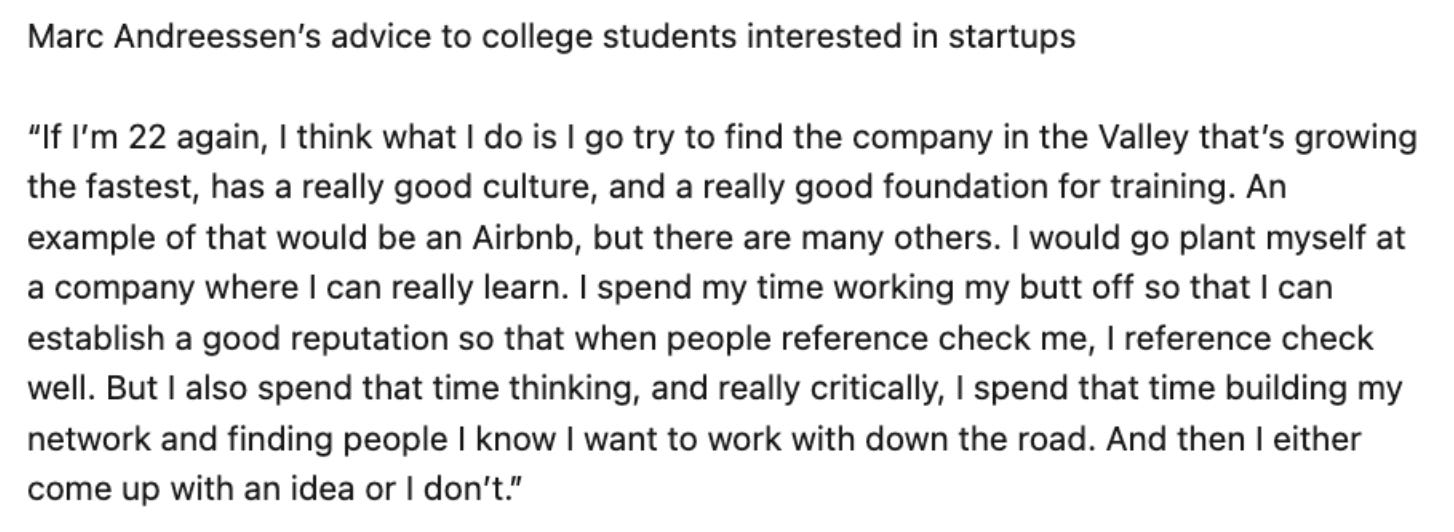The Best Job in Startups (that isn't founder)
How joining Intercom as the first finance hire set me up to start my own company
I saw this post the other day summarizing some advice Marc Andreessen gave to college students recently.
It deeply resonated with my own experience, so I thought I’d simply write a simple version of my story in the hopes that it inspires anyone else out there similarly.
My twist, that the first finance hire is actually the best position to jump into a company. But of course I’m biased!
Catching the founder bug
I was at Stanford and took a class called Engineering Entrepreneurship. It was taught by Steve Blank, who wrote The Four Steps to the Epiphany. The class was all about starting a real company. You had to go talk to customers, find a real problem, build something, and then pitch it to actual VCs. Ten weeks later, you’d be standing in front of them explaining what you built and whether anyone cared.
I remember thinking it was one of the most fun things I’d ever done.
Naturally, the next thing I did was join IBM.
I figured I’d try the big company thing. Maybe I’d like the stability. But it didn’t take long to realize that wasn’t what I wanted. I didn’t feel ownership. I didn’t feel responsible for anything meaningful. I felt like a cog in the wheel.
So I started moving toward earlier stage companies. First a 150-person startup. Then, a couple years later, Intercom, which at the time was just 20 people.
I didn’t have some grand plan. I just had a general pull. The smaller the company, the more I got to do. The more I got to do, the more I cared. The more I cared, the more fun I had.
And I always kind of knew that I wanted to start something eventually. I just didn’t have the right idea yet. I didn’t feel like I understood something deeply enough to build a product around it. And I also didn’t have the confidence in myself to figure it out from zero.
But I knew I could get closer.
How I Ended Up at Intercom
I wasn’t looking when the opportunity came up. A friend who I really trusted who was deep into the startup scene reached out and told me about the company. Which got me interested…
I met Eoghan, the CEO, and remember just feeling his energy. He had huge ambition. He did the classic ‘map out the vision’ on the whiteboard thing and I walked out thinking yea this thing could be big.
Then I started digging into their blog. Des, one of the co-founders, was writing a lot at the time. And I was really impressed. The writing was thoughtful, sharp, clear. I remember meeting Des in person and telling him how much I loved what he was writing. It gave me so much confidence that the team was smart and knew what they were doing.
Then I met Mamoon Hamid, the series A lead investor from Social Capital. I spent probably 45 minutes with him and left super impressed. Mostly I saw it as a chance to start building relationships in the investor world which I really wanted and thought would come in handy later. Both true.
The final part of my process was the least scientific but probably the most impactful. It was going on Twitter and searching for “Intercom.” The praise was really stellar. I’d not seen anything else like it, frankly. People saying they couldn’t live without the product. Screenshots. Love letters. I was currently in a company that was not product-first, where growth was mostly driven by sales and marketing. It worked for a while, but when CAC went up or LTV dropped, we had no product leverage. And we didn’t know how to build it.
Intercom was the opposite. It was product-first. The market clearly loved it. All those things got me excited and I took the jump, not knowing what it’d be come, or really expecting much. I really just thought; this’ll be a cool learning experience, I’m going to try my hardest to make it a success, and if it doesn’t I’ll figure out the next thing from there. One day at a time. But I was excited about the finance position, I thought it had a really interesting vantage point in the company.
What the First Finance Hire Actually Does
When I came in, Intercom was 20 people. I was the first finance hire.
At the beginning, I was focused on understanding how the business actually worked. I wanted to break it all down. Where did traffic come from? How did it convert? What were the steps in the funnel? What turned into ARR? What were the components of ARR? How did engagement play into it?
I wanted to be able to tell the full story. Once we had that, we could start making better decisions. We could see what was working, what wasn’t, and make real predictions.
From there, my role just kept expanding. I ran our weekly exec meeting. I ran our forecast review. I pulled together our board decks. I got pulled into board meetings. I was part of every fundraise… starting with our Series B just a few months after I joined, and every round after that.
I didn’t care about accounting. I didn’t care about getting the financials perfect. I wasn’t obsessed with whether payroll ran on time or if AP was up to date. I outsourced or automated as much of that as I could. Those things are really the trappings of the first finance position. My view was outsource them all and get to the good stuff. What’s the good stuff? Understanding the drivers of the business and giving teams clarity. I wanted to help the growth team see which experiments were working. I wanted to help product see if what they shipped was actually moving the needle. When we brought on sales and marketing, I wanted to give them visibility into their funnel, their numbers, and where they could improve.
Metrics became the thing that pulled the company together. They sat right at the intersection of product, marketing, sales, support, and strategy. They mattered to everyone, the board, the CEO, the exec team. And because I was the one building those metrics, I got pulled into everything. Which was kind of what I expected, wanted, and I didn’t really know at the time… but would really help set up life for me as a founder.
How It Set Me Up to Be a Founder
That role, being the first finance hire, is what eventually gave me the idea and the confidence to start my own company.
I spent years at Intercom building a deep understanding of how SaaS companies grow. I saw first hand what it was like to run a business. The plethora of tradeoffs and decisions that need to get made on a daily basis. The meetings. The monotony. The late nights. The mistakes. That’s again why I love the finance seat; you get to see it all! And be a part of it all. And by doing something so deeply and intensely for so long, I got to see the parts of the job that were fundamentally broken- and that’s where the spark for Equals came from.
Lastly, the role gave gave me access. I had built relationships with investors. When I went out to raise money for Equals, it was the Intercom founders who introduced me to folks I didn’t know. And I had a long list of folks I could reach out to who already knew my work.
So If You Want to Start a Company One Day…
There’s no singular path. Mine is quite different from many other founders. But if that’s what you want to do, this one worked for me;
Find a great early-stage company. Join early. Do great work. Build trust with the founders. Build trust with the investors. Learn how the business works. Become a partner to every function. Keep a list of every problem you run into. Pay attention to what bugs you and what’s missing. Reminds me of this post by Marc Andreessen:
You’ll either come up with the idea, or meet the people, or build the skills, or get the confidence, to go out and start something.
That’s what happened for me.
And it all started with the best job in startups that isn’t founder, that first finance role.



